C.A. Gray's Blog, page 35
November 12, 2021
Review of The Crown of Embers
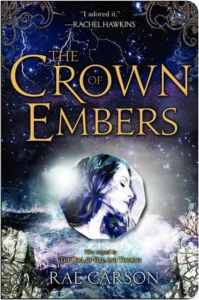
This is one of those rare books where the sequel is better than the first!
I almost didn’t decide to read on in this trilogy, because my favorite character in “The Girl of Fire and Thorns” died about 75% of the way through. I didn’t know if I cared enough about the rest of the characters surrounding Elisa to continue. But, I loved Carson’s writing style, and I thought her world complex and interesting enough that I decided to give it a chance. I’m so glad I did.
Elisa started the trilogy as a princess turned queen consort; but when her husband the king died, he named her his sole heir to the throne, and she became queen in her own right. She also “inherited” the head of the king’s royal guard, Hector. Hector was kind to Elisa when she first arrived at the palace as an overweight and backward queen consort, but I somehow was under the impression that he was much older than she was in the first book. As soon as Carson went out of her way to say how young Hector was in this one, that he wasn’t that much older than Elisa was, and by the way he was very handsome too, it was clear that he was about to become the new love interest. It was done *so well* though! The tension between them is just right, and lasts exactly as long as it needs to, with reveals on both sides in precisely the right ways and the right moments. (The only thing I’d have changed was Elisa’s bumbling awkwardness: she manages to shatter what might have been terribly romantic moments by shoving her foot right down her throat. I think it’s meant to be endearing, but it’s more like cringe-inducing. Hector, on the other hand, is just perfect.)
Meanwhile, the villainous and powerful race of the Inviernos continues to threaten Brisadulce, and someone apparently wants Elisa dead. Multiple attempts on her life both serve to advance the politics of the realm, and Elisa’s and Hector’s budding relationship. She is advised to find a husband for political reasons–a predictable trope, given the tension with the head of her royal guard. Eventually she uses this circumstance as a ruse for her to venture out on her own, in search of her destiny as the bearer of the Godstone, as written in their scriptures. Once again, shades of what I assume are the author’s religious background seem to color the text. Some scripture fragments I actually recognize from the Bible are cobbled together with archaic language that sounds like something that might appear in a different ancient religious book. Carson also explores how abused the concept of “God’s will” can be by those who make it mean whatever they want it to mean, adding a layer of fascinating richness to the story.
And the ending–ah! So perfect! I immediately had to rush on to the third and final book in the trilogy.
My rating: *****
Language: none that I recall
Violence: present but not gratuitous
Sexual content: nothing direct… I thought it was going there, and sure looked like it was going to, but it didn’t. There is a lot of discussion of premarital sex with intent, though.
Political content: none (fantasy only)
The post Review of The Crown of Embers appeared first on C.A. Gray.
November 5, 2021
Review of The Keeper of Happy Endings

Sigh. This is one of those feel-good, curl up with a good mug of tea or hot chocolate on a cold and rainy day kinds of books. I didn’t know it would be that for awhile though… I was cringing at times, fearing that I was in for a tragedy, or a bittersweet story at best. But Barbara Davis didn’t let me down.
It’s a popular style to tell WWII tales by bouncing back and forth between two characters a couple generations apart, and then to bring them together in unexpected ways. (The story could have been a Rhys Bowen novel in that way.) The story follows Soline from the 1940s, Rory from the 1980s, and then the two of them together in the 1980s as well. Soline was a Parisian dressmaker during WWII, who found herself as a volunteer at a hospital. There, she met Anson, the American love of her life, who was also a volunteer. War and tragedy conspired to sweep them apart, and Soline has lived the rest of her life alone. After suffering several more tragedies upon coming to America, Soline picked up the pieces of her life and made a name for herself as a Parisian seamstress, known for her bridal gowns which guarantee the bride a happy ending. (This is the only overt fantasy element of the story: Soline’s mother’s line passes down the gift of weaving a charm into the dress.) But alas, her bridal shop burned to the ground, and damaged Soline’s hands so that she could no longer work. By the time Rory encounters her, she’s a recluse.
Rory’s life, two generations later, parallels Soline’s story. Like Soline, she has a difficult relationship with her own mother, Camilla. She also fell in love with a heroic doctor who went missing on a mission in a third world country, and hasn’t been heard from since. Her fiancee, Hux, encouraged her to drop out of college and pursue her passion: her own art, and opening a gallery. Rory comes across Soline’s old bridal shop, burned but not ruined, which has remained empty ever since. She decides to rent the space, and finds a box of old letters from grateful brides. She’s determined to return them to Soline, which is how the two meet. They click instantly, both sensing that they are kindred spirits, and that they share even more than a strangely common past. The two women grow close, while Camilla discovers and envies Soline’s connection with the daughter from whom she is nearly estranged. But it turns out that all three women are connected in a way that would seem almost roll-your-eyes coincidental, if not for that tiny bit of magic introduced into the story by the dress charm. If that’s possible, then why not fate, or serendipity, or whatever else you might want to call it?
The last few chapters of the story were heavy with cheese, too-perfect happy endings, and on-the-nose dialogue in which each character says the sorts of direct things nobody would actually come right out and say. But I enjoyed them anyway, especially because I really didn’t expect things to turn out so well. (Modern stories generally don’t; it’s like there’s an unspoken rule against them or something.) The book certainly lived up to its name, though!
My rating: ****
Language: I can’t recall any
Violence: none
Sexual content: present but not gratuitous
Political content: none
The post Review of The Keeper of Happy Endings appeared first on C.A. Gray.
The Girl of Fire and Thorns, Rae Carson
Today’s podcast review comes from this blog review of The Girl of Fire and Thorns.
The post The Girl of Fire and Thorns, Rae Carson appeared first on C.A. Gray.
October 29, 2021
Lady’s Ransom by Jeff Wheeler
Today’s podcast review comes from this blog review of Lady’s Ransom.
The post Lady’s Ransom by Jeff Wheeler appeared first on C.A. Gray.
Review of The Girl of Fire and Thorns
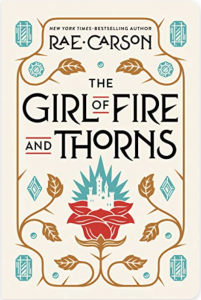
It’s rare that I enjoy a fantasy this much!
The storyline is fascinating–the fantasy elements are very religious, and tangentially related to recognizable Christian themes, but it’s set in a different universe. The fantasy revolves around the Godstone, a stone that God places in the navel of His “Chosen One” every hundred years. The stone is supposed to give the bearer some sort of mystical power to perform a great act of service… only not every bearer actually seems to complete any such recognizable act. The religion of this world borrows from some of the conundrums that many identify in Christianity, such as why God seems to allow bad things to happen to good people, and the bitter theological disputes that can arise amongst different denominations. The sacrament mentioned numerous times in this story, the sacrament of pain, seems to suggest the way many Christian denominations view suffering in our world: as a method for God to cleanse us. (I don’t agree that this is the cause of pain, but I do agree that it can serve this purpose as a side benefit.)
Elisa, the main character, is a sixteen year old princess betrothed to a king of a neighboring nation whom she has never met, but similarities to standard fairy tales end there. Elisa is the younger of two princesses, and her elder sister is far more suited to be a queen and a bride. Elisa is overweight, which is unusual in itself, as it’s a theme of the first part of the story and contributes greatly to her insecurity. She is the bearer of the Godstone, but seems to herself and also to those around her to be fairly useless.
Then she gets kidnapped, and the real story begins. At first, of course, we are led to believe that her kidnappers are evil, as she herself believes. But as the story progresses, Elisa learns a great deal about the nations around her, their political dynamics and even wars of which her new husband has been kept ignorant. She learns of and reads from religious texts that describe the purpose of the Godstone–texts she never knew existed because of the religious tradition in which she had been brought up. Her kidnappers become her friends, including both a lover and a betrayer. She loses the weight, becomes physically and mentally formidable, learns to respect herself, and finds her purpose–or so she thinks.
A semi-spoiler and a warning: about 70% through the story, one of my favorite characters dies. I didn’t see it coming, and was shocked and dismayed… but I’d already invested so much in the story that I kept going. Afterwards I realized, how could it have happened any other way? But… ugh. Even so, Elisa herself is a compelling enough character and the world is fascinating enough that I’m glad I finished it, and I even might go on to the next book in the series.
My rating: *****
Language: none
Violence: present but not excessive
Sexual content: none
Political content: none (fantasy only)
The post Review of The Girl of Fire and Thorns appeared first on C.A. Gray.
October 22, 2021
The Bible Code by Michael Drosnin
Today’s podcast review comes from this blog review of The Bible Code.
The post The Bible Code by Michael Drosnin appeared first on C.A. Gray.
October 20, 2021
Review of Once Upon a Broken Heart
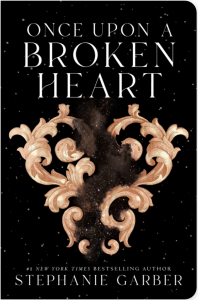
There is something magical about the combination of Stephanie Garber’s narrative style, and Rebecca Soler’s voice. The world created by the combination of the two is delightful, almost regardless of the actual story. I’m glad, though, that this story is set in the same world as Caraval–in fact, Scarlett and Donatella are both peripheral characters, though Tella is mentioned more frequently because Jax (the Prince of Hearts, whose heart Tella broke) is the male lead. I don’t remember all the details of the Fates that were freed from their imprisonment in a deck of cards in the Caraval series, but it doesn’t really matter; one needn’t have read the first series in order to follow along with this one.
The story follows Evangeline Fox, a girl whose true love, Luc, suddenly became engaged to her stepsister Marisol. In her desperation to stop the wedding, Evangeline prayed to the Prince of Hearts, who appeared and agreed to answer her plea–for a fee of three kisses, to be given to a recipient and at a time and place of his choosing. Evangeline knew at the outset that Jax was not to be trusted. So when Jax’s method of stopping the wedding turns out to involve turning the wedding party to stone, this unfortunately doesn’t excuse Evangeline from her end of the bargain.
Garber creates a new event, similar to Caraval, called Nochte Never Ending: a ball in which the realm’s Prince Apollo is to choose a bride. Apollo appears to be arrogant, bored, and utterly devoid of feeling, until Jax chooses him as the recipient of Evangeline’s first kiss. The whirlwind romance that ensues (on Apollo’s side, at least) is gag-worthy, but most of that is intentional, a result of curses and spells. As the tale goes on, Evangeline learns that Jax had an ulterior motive in his desire for her to marry Prince Apollo: she appears to be the subject of a prophecy, of one who will open the Valerie Arch. Unfortunately, Evangeline has no idea what the Valerie Arch is, why Jax wants it opened so badly, or why other characters desperately want to keep it closed.
This is definitely a story for women only, I think–more so even than most romances. It’s alllll about kisses, romance, attraction, and obsession, to the point where it was even a little too much for me. It’s clean, at least, though–there’s one scene that seems like it might get a little pornographic, but it never actually goes there. When the story is not focused on romance, it’s heavy on fantastical description (and there are really an inordinate number of ball gowns). I still really enjoyed it, though, mostly because the whimsical settings were so rich that I felt like I could get lost in them.
My rating: ****
Language: none
Violence: none (fantasy only)
Sexual content: none (though it flirts with it)
Political content: none
The post Review of Once Upon a Broken Heart appeared first on C.A. Gray.
October 15, 2021
Starsight by Brandon Sanderson
Today’s podcast review comes from this blog review of Starsight.
The post Starsight by Brandon Sanderson appeared first on C.A. Gray.
Review of Lady’s Ransom
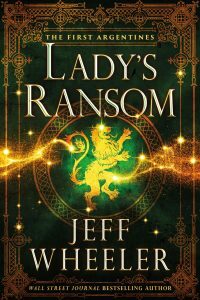
I found the first 1/4 to 1/3 of this book to be slow, probably because our main characters were happy and mostly conflict-free. Ransom and Claire were married, and in love with each other. Claire fell pregnant, though her pregnancy is a difficult one. There’s some far-off political intrigue that calls Ransom away, and Claire has strange and unfounded insecurities that he will be unfaithful to her. But none of that is conflict yet.
The political machinations that fill in the majority of Wheeler’s plots quickly swept me up once Ransom was away from Claire and off serving his king, though as usual, I don’t feel I have a good grasp on the relationships between the various kingdoms and the structures of their hierarchies. Claire was in a tower with the Queen Dowager when her husband was still alive, but she’s also a queen in her own right? I know that was hinted at before but I didn’t understand it. Somehow Ransom was in service to both the Queen Dowager Emiloh and also to her son, King Benedict, as he had previously served the Elder King (the one who had locked Emiloh in the tower in the first place). Emiloh’s other son Jon-Landon was a usurper to his brother. I’ve never watched Game of Thrones (nor do I want to, as I understand it’s basically nonstop sex and violence) but I imagine Wheeler’s worlds are essentially a clean version of that.
The most interesting part of the story, for me, was when Claire encountered magical objects that controlled her mind and heart, and she changed into someone else. She refused to give them up even though Ransom felt they were forbidden by the Fountain, because she came from a different country and had different religious beliefs — she didn’t believe in the Fountain. Meanwhile, the widow whom the Elder King had wanted Ransom to marry instead, the Duchess of Brythonica, Constance, made the comment that she felt her fate and Ransom’s were somehow intwined–and Claire had the same feeling about them too, which drove some of her jealousy. I imagine this was a setup for a later book in the series, because it was never explained in this one. Ransom discovered the Wizr set which governs the fate of nations, and managed to steal it in the nick of time with the help of the Fountain. It’s the magic and the relationships, set in the backdrop of political intrigue, that always keeps me hooked on Wheelers’ series.
My rating: ****
Language: none
Violence: none
Sexual content: none
Political content: none
The post Review of Lady’s Ransom appeared first on C.A. Gray.
October 8, 2021
Review of The Bible Code
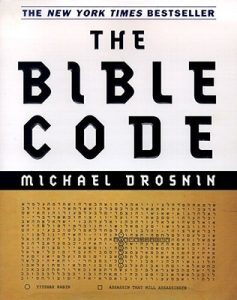
Very interesting concepts. Drosnin did not discover the Bible Codes he describes here; he’s a reporter (and an atheist one at that) who stumbled upon the discovery via a computer program discovered by a Jewish rabbi. He then cross-referenced it with numerous mathematicians who could not disprove it. (Incidentally, Isaac Newton was convinced such a code existed, and spent more of his time searching for it than he did on any of his scientific theories. But as Drosnin points out, perhaps it was time-locked; Newton could not have found it because computers had yet to be invented.) Through the code, which used some of the same code-breaking techniques employed during WWII (and probably far beyond) such as very complex skip sequences and such, he found prophecies of major world events which did indeed occur. Still he was skeptical, until he encountered the prediction of the then-Israeli prime minister’s assassination. He happened to have a connection to the PM (Rabin), and warned him of the potential danger. Rabin ignored the warning, and he was assassinated right on schedule. After the fact, Drosnin saw that the name of Rabin’s assassin was in the code too–they just hadn’t known to look for it beforehand.
This made a believer (in the code, not in God, strangely enough) out of Drosnin, but it sent him into the tailspin question posed by the Oracle to Neo in The Matrix: “What’s really going to bake your noodle is, would you still have broken it (the vase) if I hadn’t said anything?” In other words, now that we know about potential dangers, can we do anything to change it? Thus enters physics concepts of determinism vs quantum physics. As Drosnin and those who knew the code and had the program did more and more searches, they encountered a number of predictions that had yet to occur. Some were very specific, and did not happen… but those predictions also included phrases near them like, “delayed” or “will you change it?” or multiple potential years for said event to come about. Most notably, he discovered years of threatened nuclear war in the Middle East which might lead to Armageddon — but those years were 1996, 2000, and 2006. Were there other potential years as well? Was crisis effectively averted by choices made by those in power (as a result of knowledge about the code or otherwise)? I was most struck by one such prediction from 1996, when Israel’s Netanyahu was to go and visit a neighboring world leader on Tisha B’Av, or the 9th day of the Hebrew month of Av. (Incidentally this date twice marked the destruction of the Jewish temple: once by the Babylonians in 423 BC, and once by the Romans in 70 AD. Traditionally it’s also the date that the 12 spies returned from the Promised Land with an evil report, leading to 40 more years of wandering in the wilderness.) The date is considered cursed by the Jews, and they observe it with fasting and prayer — so it seemed strange to me that Netanyahu would have chosen an important meeting on that date. According to the code, there was a threat that Netanyahu would be assassinated that day, an event which would lead directly to nuclear conflict and the End of Days. But, by happenstance, the other world leader was ill, Netanyahu delayed his trip 10 days, and later those with access to the program saw the word “delayed” across the date of the visit. Nothing happened, of course. Could such a small occurrence have changed world events? As Drosnin pointed out, WWI began with an assassination, which almost didn’t occur–Archduke Ferdinand’s driver turned down the wrong street, they encountered their assassin who had missed his opportunity earlier that day and was otherwise on the point of giving up, and the rest is history.
I’m intrigued by the concept, bottom line. I hold the Bible as the inerrant word of God, and believe every word is there for a reason. There are no extraneous details. But if that goes for the text as written, could it also go for the structure of the text, too? If it did, though, what would be the reason for it–unless it were possible for those of us with access to its future warnings (after the invention of the computer, and the discovery of the code) to use that information to our advantage?
My rating: ****
Language: none
Violence: none
Sexual content: none (it’s nonfiction)
Political content: none (no agendas I could discern, anyway)
The post Review of The Bible Code appeared first on C.A. Gray.



